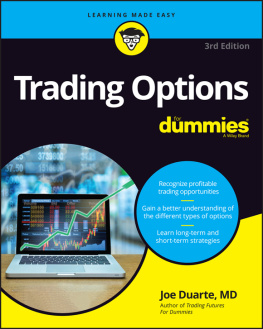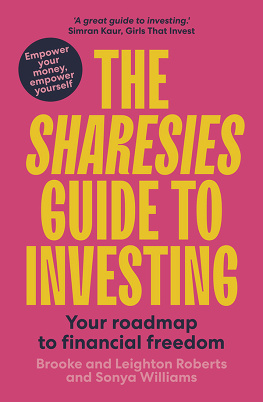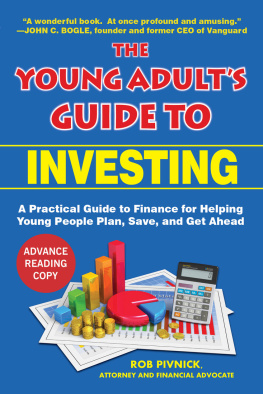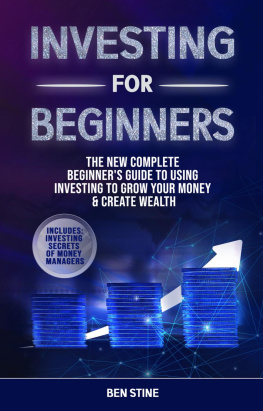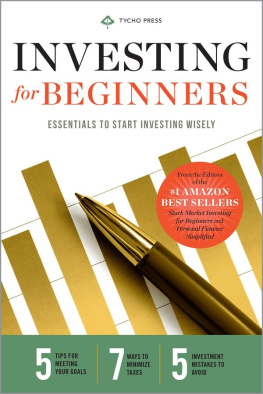THE

INVESTING
IN YOUR 20S
& 30S BOOK
Learn how to manage your money and start investing for your futurenow!
Joe Duarte, MD

Avon, Massachusetts
To readers, thinkers, and doersyoung and old.
Contents
Top 10 Tips That Will Keep You in the Money
- Never stop trying to get better at investing. Never stop learning about how markets work. Take courses. Read books. Ask questions. And dont be afraid to admit that youve made a mistake. Mistakes, which can cost you some money, are the things that teach us how to become better investors.
- Set realistic goals. If you have $1,000 to get started, then dont expect to quit your job one month into your investment life.
- Be specific, detailed, and disciplined about what you will set aside for investment, how often you will invest it, and how you will monitor your success.
- Be a penny pincher. Before you think of investing, make sure you have enough money set aside to get started and never stop adding to your account.
- Be patient and picky. If an investment does not meet your strict criteria, skip it. You may miss a great opportunity but youll be able to sleep at night.
- Stay plugged in. Never skip a day when you dont know the big picture in your investments. If you own stocks or stock mutual funds, you should, at the very least, know how the stock market closed every day.
- Never assume anything. Always figure it out for yourself. Dont be intimidated by data or talking heads on TV, radio, and the Internet. If you dont get or believe what theyre saying, go research it. Figure it out for yourself.
- Never follow hot tips. A hot tip is usually old news or insider trading. Either way you lose.
- Get a daily routine. Once you find something that works, stick with it. Read the same paper. Go to the same websites. Drink the same drink. At the same time, be true to yourself; if something is not working, its time to change it.
- If you dont enjoy investing, maybe you should consider an investment advisor.
Introduction
EVERY DECADE OR SO, the economic cycle turns and the prevalent trend shifts the other way. In the 1990s, recession gave way to the Internet boom, which eventually came crashing down. The twenty-first century was all about real estate and housing, until that market fizzled and burned. Every boom and bust creates a new set of challenges and opportunities, especially for those who understand the dynamics of markets and how to navigate them.
Yet, many people dont realize that knowledge, preparation, patience, and realistic expectations are the key to being a successful investor. If you throw in a dash of good humor and add the fact that you are young, the odds of maximizing your potential for building wealth are on your side. You can invest in stocks, bonds, and real estate. And you can, if you know what to look for and how to plan accordingly, both profit on the way up, and protect your gains while minimizing losses when the trend eventually turns.
Change is inevitable. Markets will rise and fall. The political landscape will change, often very dramatically in moderate periods of time. And life will go along with the change. Yet, if you observe, learn, plan, adjust, and make sound decisions, you will likely be much better off with your investments than if you just try to fly by the seat of your pants or simply hope for the best. Too many times people will make hasty decisions about investments based on tips, whims, or impulse.
If the market is rising, everyone is happy. When markets fall, the average person just tends to hope that things will get better. If things dont, people abandon investing altogether. Dont get discouraged. The fact is that you can manage your losses. You can make money if the markets fall. And you can, with a certain degree of accuracy, predict and prepare for significant changes of direction in the market.
This book is about getting organized, how to gather information, and how to participate, based on your risk profile, in the stock, bond, and real estate markets. Its about having a long-term plan, but also how to adjust your plan. Its about getting to know your own willingness to take risk and how to manage your risk. And its all about choosing investment classes, such as stocks, bonds, real estate, and mutual funds, and how to put them together in an asset allocation mix that makes sense for you. Its also about how to save for your retirement and your childs education. More importantly, its designed and written with one single goal: to guide you to build your wealth without guesswork and anguish.
In the end, time is on your side. If you start investing in your 20s and 30s, you will have ample opportunities to build the kind of financial future that you are looking for. Get started. Times a wasting.
CHAPTER 1
Are You Ready to Become an Investor?
If current socioeconomic trends continue, people of all ages will need to contribute more of their own money toward their retirement. If that process seems daunting, consider the fact that the longer you put off getting started investing, the harder it may be to build enough of a nest egg to make life easier in the future. So in order to be ready, its important to understand the big picture. Investing is the long-term process by which you build wealth, and has two basic componentssaving and compounding. Saving is the act of putting money away for the purpose of investing. Compounding is what money does for you by earning interest, and by the price appreciation of your investments, or both. Together these two processes grow your money. Once you understand these concepts, you are ready to get started.
Can You Afford to Invest?
You have to start somewhere. At the early stages of the investing process important questions should be raised. Simply stated: Investing without money is like quenching thirst without water. Start by asking the question of whether you can afford to invest. By doing that youve made some progress, as other important questions will follow.
How Will You Finance Your Investing?
The money you use for investing can come from anywherea savings account, an inheritance, or even a lottery win. For most people, investment money is money earned from a job or profession. If youve got some money already put aside, youre ahead of the game. The more you have, the better your starting point. The least desirable money source to start an investing plan is to get a loan, as that would start your investment plan at a deficit.

Build your savings first. Billionaires build their fortunes by owning and managing their businesses. The stock market is a place where they preserve the purchasing power of their fortunes. For example, Warren Buffett, through his company Berkshire Hathaway, owns businesses such as Geico and General Reinsurance Corporation. He uses the profits from his businesses to buy stock in other companies like Coca-Cola. That way he diversifies his holdings, but also earns dividends and price appreciation from the stock market.
A simple way to figure out if you can afford to invest is to count how much money you have left at the end of the month after all your bills are paid. If its $100, thats as good a place to start as any, and that is money that will be put to good use by saving it in a bank account or a money market mutual fund. A money market mutual fund is a special type of mutual fund that invests in short-term interest paying bonds (maturity of less than 90 days) such as U.S. government treasury bills or what is known as commercial paper (similar short-term bonds issued by corporations). Think of a money market mutual fund as a holding tank for your money while you decide what to do with it. If its less than $100, it means that you need to work a little harder at controlling your expenses.


